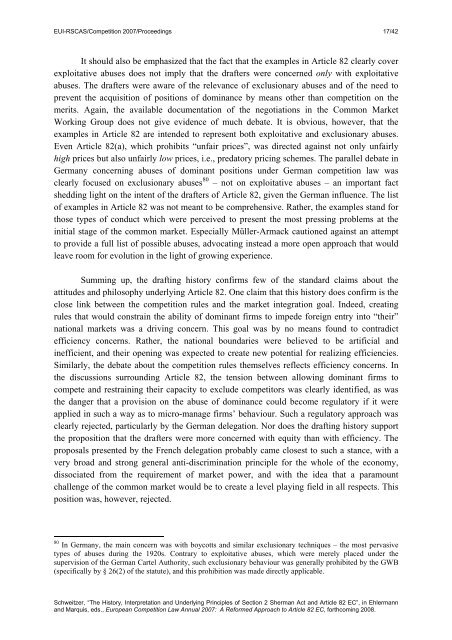The History, Interpretation and Underlying Principles of Section
The History, Interpretation and Underlying Principles of Section
The History, Interpretation and Underlying Principles of Section
You also want an ePaper? Increase the reach of your titles
YUMPU automatically turns print PDFs into web optimized ePapers that Google loves.
EUI-RSCAS/Competition 2007/Proceedings 17/42<br />
It should also be emphasized that the fact that the examples in Article 82 clearly cover<br />
exploitative abuses does not imply that the drafters were concerned only with exploitative<br />
abuses. <strong>The</strong> drafters were aware <strong>of</strong> the relevance <strong>of</strong> exclusionary abuses <strong>and</strong> <strong>of</strong> the need to<br />
prevent the acquisition <strong>of</strong> positions <strong>of</strong> dominance by means other than competition on the<br />
merits. Again, the available documentation <strong>of</strong> the negotiations in the Common Market<br />
Working Group does not give evidence <strong>of</strong> much debate. It is obvious, however, that the<br />
examples in Article 82 are intended to represent both exploitative <strong>and</strong> exclusionary abuses.<br />
Even Article 82(a), which prohibits “unfair prices”, was directed against not only unfairly<br />
high prices but also unfairly low prices, i.e., predatory pricing schemes. <strong>The</strong> parallel debate in<br />
Germany concerning abuses <strong>of</strong> dominant positions under German competition law was<br />
clearly focused on exclusionary abuses 80 – not on exploitative abuses – an important fact<br />
shedding light on the intent <strong>of</strong> the drafters <strong>of</strong> Article 82, given the German influence. <strong>The</strong> list<br />
<strong>of</strong> examples in Article 82 was not meant to be comprehensive. Rather, the examples st<strong>and</strong> for<br />
those types <strong>of</strong> conduct which were perceived to present the most pressing problems at the<br />
initial stage <strong>of</strong> the common market. Especially Müller-Armack cautioned against an attempt<br />
to provide a full list <strong>of</strong> possible abuses, advocating instead a more open approach that would<br />
leave room for evolution in the light <strong>of</strong> growing experience.<br />
Summing up, the drafting history confirms few <strong>of</strong> the st<strong>and</strong>ard claims about the<br />
attitudes <strong>and</strong> philosophy underlying Article 82. One claim that this history does confirm is the<br />
close link between the competition rules <strong>and</strong> the market integration goal. Indeed, creating<br />
rules that would constrain the ability <strong>of</strong> dominant firms to impede foreign entry into “their”<br />
national markets was a driving concern. This goal was by no means found to contradict<br />
efficiency concerns. Rather, the national boundaries were believed to be artificial <strong>and</strong><br />
inefficient, <strong>and</strong> their opening was expected to create new potential for realizing efficiencies.<br />
Similarly, the debate about the competition rules themselves reflects efficiency concerns. In<br />
the discussions surrounding Article 82, the tension between allowing dominant firms to<br />
compete <strong>and</strong> restraining their capacity to exclude competitors was clearly identified, as was<br />
the danger that a provision on the abuse <strong>of</strong> dominance could become regulatory if it were<br />
applied in such a way as to micro-manage firms’ behaviour. Such a regulatory approach was<br />
clearly rejected, particularly by the German delegation. Nor does the drafting history support<br />
the proposition that the drafters were more concerned with equity than with efficiency. <strong>The</strong><br />
proposals presented by the French delegation probably came closest to such a stance, with a<br />
very broad <strong>and</strong> strong general anti-discrimination principle for the whole <strong>of</strong> the economy,<br />
dissociated from the requirement <strong>of</strong> market power, <strong>and</strong> with the idea that a paramount<br />
challenge <strong>of</strong> the common market would be to create a level playing field in all respects. This<br />
position was, however, rejected.<br />
80 In Germany, the main concern was with boycotts <strong>and</strong> similar exclusionary techniques – the most pervasive<br />
types <strong>of</strong> abuses during the 1920s. Contrary to exploitative abuses, which were merely placed under the<br />
supervision <strong>of</strong> the German Cartel Authority, such exclusionary behaviour was generally prohibited by the GWB<br />
(specifically by § 26(2) <strong>of</strong> the statute), <strong>and</strong> this prohibition was made directly applicable.<br />
Schweitzer, “<strong>The</strong> <strong>History</strong>, <strong>Interpretation</strong> <strong>and</strong> <strong>Underlying</strong> <strong>Principles</strong> <strong>of</strong> <strong>Section</strong> 2 Sherman Act <strong>and</strong> Article 82 EC”, in Ehlermann<br />
<strong>and</strong> Marquis, eds., European Competition Law Annual 2007: A Reformed Approach to Article 82 EC, forthcoming 2008.

















